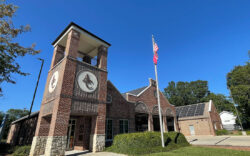The Athens-Clarke County Commission is headed for a vote Tuesday, Dec. 3 that could decide the future of downtown Athens, and a compromise proposal now on the table makes it more likely that a new West End historic district protecting landmarks of Athens black history and the local music scene will pass.
A number of property owners spoke in opposition to a proposed historic district for the western end of downtown at a commission meeting last week. They were joined by members of five downtown churches who also oppose the new district.
Historic districts require that property owners, including churches, gain approval from the Historic Preservation Commission (HPC) before they can renovate or demolish their properties. They also require that any changes meet certain design guidelines. Most property owners in the area don’t want that extra hurdle in their way, and some expressed concern that a historic district could harm their property’s resale value. One property owner even blasted the proposal as an inconsistently applied “weaponization” of historic preservation.
Commissioner Melissa Link, the main proponent of this idea, sees a new historic district as necessary to protect the western end of downtown from development that she believes a majority of Athenians would oppose. “It’s only a matter of time before we see a luxury student high-rise directly across the street from the 40 Watt,” she said. According to Link, “That would be the end of Athens music culture.” She implored her fellow commissioners to support the plan, which would also protect the historic African American business district celebrated every year at the Hot Corner festival on the corner of Washington and Hull streets. “How impactful would that festival be, if that block were replaced with a luxury student housing project?” wondered Link.
Link kicked this all off in January, when she succeeded in blocking the demolition of the Saye Building, owned by First United Methodist Church, on North Lumpkin Street by establishing a one-year moratorium. Since then, the HPC has held public forums, developed design guidelines and conducted a survey of property owners. Most property owners who responded to the survey oppose the new district, but the HPC nevertheless recommends approval before the moratorium expires in February.
A downtown historic district established in 2006 only extended from Lumpkin Street east. The new local historic district, as originally proposed, would include all of the west end of downtown, but also buildings west of Pulaski Street, out to Newton Street, and north of Dougherty Street. That means it would extend beyond the already existing national historic district, which was originally established in 1978 but provides little protection, since most land-use decisions are made at the local level. Tommy Valentine, executive director of Historic Athens, spoke in favor of the new local district, but limited his support to only the area overlapping with the national district. Commissioner Mike Hamby seemed to support shrinking the size of the proposed district as well. That would let four of the five downtown churches off the hook, and that might be an attractive compromise for some commissioners who are currently undecided.
And Sunday, Valentine announced that Historic Athens has endorsed a commission-defined option from Hamby and Link that would shrink the local historic district boundaries to the national district—roughly Lumpkin to Pulaski and Clayton to Hancock, with a few buildings on Broad and Dougherty included as well. This would preserve the core of the district along Clayton and Washington, where support runs strong, while removing many of the more contested properties on the outskirts.
“Our organization was founded more than 50 years ago in response to concerns about preserving the culture and architecture of Athens,” Valentine said in a news release. “For decades, part of that work has been dedicated to expanding protections for our historic downtown. We are excited and encouraged that commissioners Hamby and Link have found a way forward on a compromise that enhances local protections for some of the most defining features of our community.”
While carefully researched, the staff-proposed boundaries proved politically polarizing, Valentine said, and there were doubts about whether it could pass. Sidelining First Christian Church, Redeemer Presbyterian, First Baptist and First AME, as well as other controversial properties, increases the chances of the district passing. The new proposal also recognized a key West Washington Street property as contributing based on research brought forward by owner Drew Dekle.
Like what you just read? Support Flagpole by making a donation today. Every dollar you give helps fund our ongoing mission to provide Athens with quality, independent journalism.










